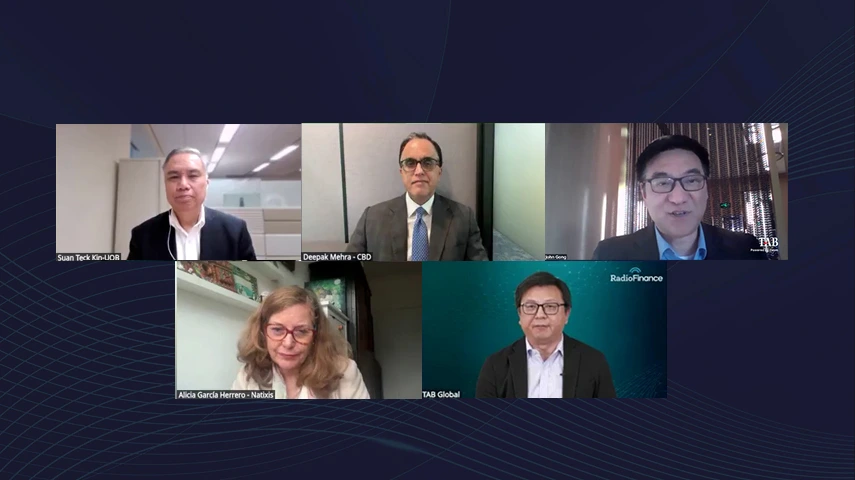
Interviewed by Foo Boon Ping
At a recent roundtable, chief risk officers (CROs) from major banks across Asia Pacific discussed strategies for tackling emerging threats and building operational resilience in the digital age. The roundtable was held in conjunction with The Asian Banker Summit 2024 on 23 May at the Conrad in Hong Kong.
The panel included representatives in Hong Kong from Standard Chartered Bank, Haitong International Securities, Fubon Bank, State Street, Bank of East Asia, WeLab, and OCBC; GX Bank, Malaysia; BIBD At-Tamwil, Brunei; Bank of Ayudhya, Thailand; CTBC, Taiwan; and Oracle.
A resounding theme was the imperative for innovation and keeping pace with new technologies like artificial intelligence (AI), open finance, and collaborations in application programming interfaces to maintain a competitive edge. However, this goes beyond CROs’ traditional risk management expertise, sparking fears that failing to innovate could lead to a loss of competitive advantage—a concern they need to weigh against long-standing risk frameworks.
The roundtable emphasised the need for a cultural shift, moving away from history-based risk models towards proactively anticipating unknown future threats. This requires cross-functional collaboration, adapting policies and frameworks, and board engagement to foster an environment geared towards identifying risks over the horizon. As banks increasingly adopt external solutions, establishing clear accountability and aligning with the bank’s risk framework is essential for managing third-party and vendor risks effectively.
Participants stressed the importance of thoroughly evaluating the strengths, limitations, and potential unintended consequences of emerging technologies like distributed ledger technology and AI and machine learning (ML) before implementation. On the upside, effective leveraging of AI and ML can significantly enhance anti-money laundering efforts, monitoring compliance with sanctions issued globally, and enabling real-time transaction screening.
Traditional risk models may not align well with profitability goals, especially for virtual banks, necessitating new approaches to harmonise risk and acquisition decisions while incorporating best practices in model risk management. Bridging knowledge gaps by upskilling staff on new technologies and risk terminologies is vital for consistent and effective risk management across varying levels of experience.
Given the rapid pace of digitalisation, robust cybersecurity measures, data privacy compliance, and real-time monitoring capabilities are critical to safeguard against data breaches, cyber fraud, and emerging risks like deepfakes. Addressing vulnerabilities in cloud infrastructure and adhering to increasingly stringent data laws across jurisdictions like China and Hong Kong add further complexity.
Climate risk integration into enterprise risk management models has become a priority, with banks needing to incorporate climate risk scenarios while preparing for intensifying regulatory demands surrounding sustainability reporting.
Compliance with Greenhouse Gas Protocols Scope 1, 2, and 3 carbon emissions, and building robust data management and governance frameworks as a prerequisite for effective climate risk management, regtech or transition to Basel 4 are critical areas of focus in the years ahead.
Data aggregation, validation, and reporting are also elements in stress testing which requires banks to be able to aggregate risk and financial data across the entire organisation or enterprise, as mandated by Basel Committee on Banking Supervision (BCBS 239) as early as 2013 to enable integrated risk management.
In most banks, a substantial amount of work remains to be done to fulfil the BCBS 239 directive. Part of the issue discussed was the operational risk emerging with digitalisation and legacy mainframe infrastructure, and the amount of data in them. Building a new solution is easy but to transition the data to use in the new system is a challenge for banks.
The way forward, as highlighted by participants, involves leveraging subject matter experts as the first line of defence for risk identification, while using technology to drive data integration. Striking the right balance between nurturing people skills and deploying technological solutions will be pivotal for unlocking data’s potential in fortifying risk management capabilities.
The roundtable underscored the pressing need for banks to bolster operational resilience by bridging the divide between innovation and traditional risk management practices. This necessitates cross-functional collaboration, investments in robust data governance, and comprehensive integration of emerging risks into existing frameworks—a transformational undertaking, but one that is crucial for sustainable growth and risk mitigation in the digital era.

Customers in Malaysia increasingly expect international payments to be as seamless as local transfers. At a closed-door roundtable convened by TAB Global with Visa, participants examined how banks are adapting to these expectations while…

At the Temenos Regional Forum Asia Pacific in Manila, Chi Li’s keynote and a panel discussion with Frankie Wai, Foo Boon Ping and Neil Tan examined how banks are approaching AI adoption with increasing caution, embedding governance from…

The Japan Banking Innovation Conference 2025, held at The Westin Tokyo, convened over a hundred senior banking executives, fintech leaders, policymakers and technology pioneers to discuss the fundamental shifts redefining financial services.

As the global banking industry braces for a challenging 2025, it faces economic headwinds, geopolitical tensions, trade realignments, and the push for sustainability and technological innovation

The AWS Financial Services Symposium Singapore 2024 showcased how AI, data, and cloud technologies are revolutionising financial services. Industry leaders from AWS and HSBC shared insights into advancing innovation, regulatory responsibility…

By continuing to browse this website, you agree to our privacy policy.